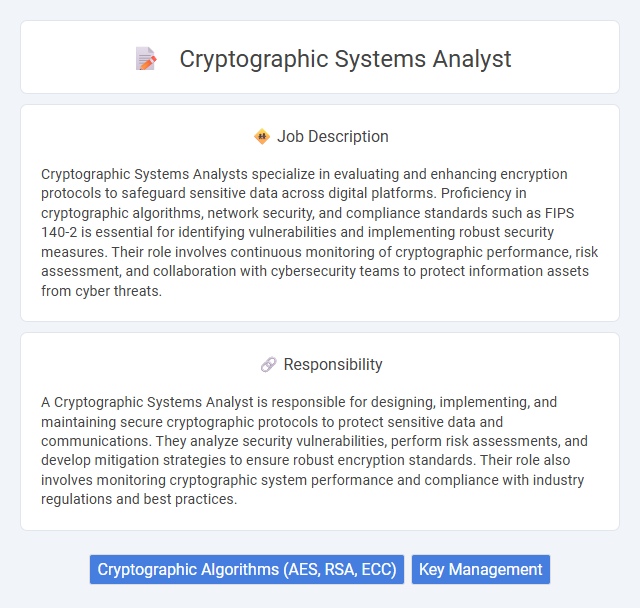
Cryptographic Systems Analysts specialize in evaluating and enhancing encryption protocols to safeguard sensitive data across digital platforms. Proficiency in cryptographic algorithms, network security, and compliance standards such as FIPS 140-2 is essential for identifying vulnerabilities and implementing robust security measures. Their role involves continuous monitoring of cryptographic performance, risk assessment, and collaboration with cybersecurity teams to protect information assets from cyber threats.
Individuals with strong analytical skills and a passion for mathematics or computer science are likely to be well-suited for a Cryptographic Systems Analyst job. Those comfortable working with complex algorithms and detail-oriented problem-solving may find this role rewarding. People who prefer routine tasks or lack patience for continuous learning might struggle in this dynamic and technically demanding field.
Qualification
A Cryptographic Systems Analyst must possess a strong foundation in computer science, cybersecurity, and applied cryptography, often requiring a bachelor's degree in these fields or related disciplines. Expertise in encryption algorithms, cryptographic protocols, and security standards such as AES, RSA, and TLS is essential, along with experience in threat analysis and risk assessment. Proficiency with programming languages like Python, C++, or Java and familiarity with security tools and frameworks enables effective design, evaluation, and implementation of secure communication systems.
Responsibility
A Cryptographic Systems Analyst is responsible for designing, implementing, and maintaining secure cryptographic protocols to protect sensitive data and communications. They analyze security vulnerabilities, perform risk assessments, and develop mitigation strategies to ensure robust encryption standards. Their role also involves monitoring cryptographic system performance and compliance with industry regulations and best practices.
Benefit
Cryptographic Systems Analysts likely provide enhanced security for sensitive data through advanced encryption methods, reducing the risk of cyber threats significantly. Their expertise may facilitate compliance with regulatory standards, potentially lowering legal and financial liabilities for organizations. Companies could experience improved trust from clients and partners by employing robust cryptographic solutions designed and analyzed by these specialists.
Challenge
A Cryptographic Systems Analyst likely faces the challenge of constantly adapting to evolving encryption threats and emerging cyberattack techniques. The role probably demands a high level of precision and expertise to ensure data integrity while developing and evaluating secure cryptographic protocols. Navigating complex regulatory requirements and optimizing system performance under these constraints may represent ongoing challenges in this position.
Career Advancement
Cryptographic Systems Analysts play a crucial role in designing and analyzing secure communication protocols, often working with advanced encryption technologies to protect sensitive data. Career advancement opportunities include moving into senior cybersecurity roles, such as Cryptography Engineer or Chief Information Security Officer (CISO), where strategic decision-making and leadership skills become essential. Building expertise in emerging cryptographic methods like quantum-resistant algorithms and obtaining certifications such as CISSP or CEH significantly enhance prospects for promotion and specialized roles.
Key Terms
Cryptographic Algorithms (AES, RSA, ECC)
A Cryptographic Systems Analyst specializes in designing, analyzing, and implementing secure cryptographic algorithms such as AES (Advanced Encryption Standard), RSA (Rivest-Shamir-Adleman), and ECC (Elliptic Curve Cryptography) to protect sensitive data. They conduct vulnerability assessments and optimize encryption methods to enhance data confidentiality, integrity, and authentication in communication systems. Mastery of algorithmic complexity and cryptographic protocols ensures robust defenses against cyber threats and unauthorized access.
Key Management
A Cryptographic Systems Analyst specializing in Key Management ensures the secure generation, distribution, storage, and rotation of cryptographic keys to protect sensitive data and prevent unauthorized access. This role involves analyzing cryptographic protocols, implementing key lifecycle management solutions, and maintaining compliance with industry standards such as NIST and FIPS. Mastery of encryption algorithms, hardware security modules (HSMs), and secure key vault technologies is essential for effective threat mitigation and system integrity.
 kuljobs.com
kuljobs.com